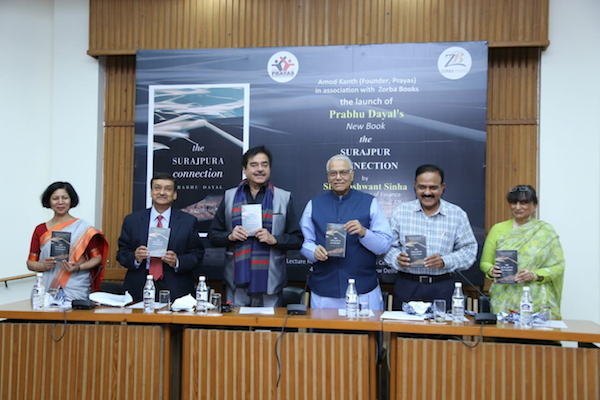Parikarma (108 pages)
Genre: Fiction

Baldev Singh Grewal’s Parikarma (108 pages), originally written in Punjabi has been translated into Shahmukhi with the title Twaaf, and in Hindi with the title Parikrama. The work of fiction is part of the syllabus of Post graduate course in Punjabi in Kurukshetra University and Chaudhary Devi Lal University, Sirsa, Haryana. The original Punjabi version has seen three reprints. Baldev Singh Grewal is a senior New York-based author who has a number of novels to his credit. His novella “Twaaf”, transliterated from Gurmukhi into Arabic-based Shahmukhi script by Ziaullah Zaheer Sara, has been published by Sanjh Publications, Lahore.
The original title “Parikarma” meaning circumambulation has been changed into Twaaf which has the same meaning but is more familiar with the readers on this side of the border. It’s a story of a village, of an extended family, to be exact, narrated in the first person singular. Old debate whether first person singular is more suitable or third person singular for fiction is still inconclusive. Both have successfully been employed by writers. In the novel in question, the first person singular is the narrator through and through and doesn’t seem jarring. His tone and tenor engage you and create a sense of intimacy with the non-judgmental account of his life.
The author’s use of flashback as a literary technique seems effective. The entire story is told in flashback, rather in a series of flashbacks. Reverie, visitation from the past, imaginings and actual happenings intermingle but in no way interrupt the smooth flow of the narrative. The major characters in the story are a father and his son, a mother and a young woman and her husband. Son, the main protagonist, falls in love with a girl in the village. The son’s father in cahoots with the girl’s father bribes the area police who pick him and severely torture him as a dangerous Naxalite in a fake case. The girl is married off against her will to the father’s nephew who is impotent but violent in his sexual behavior. The husband in what one should call his impotent rage commits suicide. The father holds his son responsible for the tragic event and banishes him from the home. The son goes to the USA and now after forty years has come back to his home which is no more than a ruin guarded by a locked gate. What remains of the past is an old weather-beaten mango tree. The story is remarkable for some unremarkable reasons; a ruthless patriarch in connivance with the girl’s father deprives his son of happy future life and ends up unjustly supporting his sister’s family which leads to the destruction of his own nuclear family. Baldev Singh perhaps subtly tries to debunk the myth of moribund patriarchy by showing what it is; odious and repressive. The narrative is simply gripping as it’s familiarly unfamiliar and unfamiliarly familiar. Don’t miss it. — soofi01@hotmail.com
(Dawn, Karachi. February 7th, 2022)








Be the first to comment